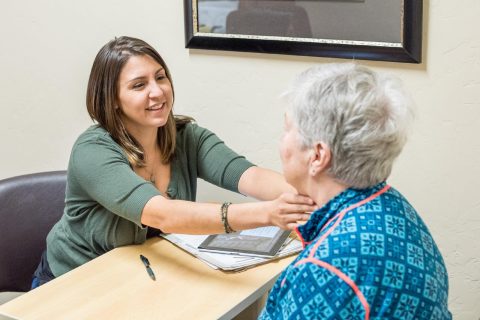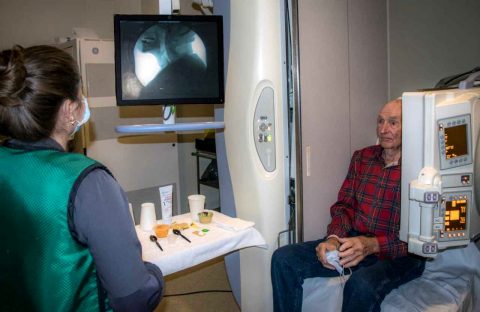Speech Therapy

If you or a loved one are having difficulty communicating with others, eating, or completing other daily tasks, we can help. Speech-language pathologists are trained in identifying and treating communication, cognitive, and swallowing disorders; our goal is to design a program for each patient’s individual needs. Whether our patients are looking to improve how they speak, how they chew and swallow, or how they understand and interact within their community, we have amazing treatment plans and experts available for you.
For your convenience we provide speech, language and swallowing therapy services at all of our community clinic locations. If you have the slightest concern in one or more of these areas, call us today at 970.384.7550 to schedule your appointment. Let’s see how we can help you.
Speech Therapy Staff:
Heather J Bever, MA, CCC-SLP
Nick Damico, MS, CCC-SLP
Molly Damico, M.S., CCC-SLP
Linnea Kehm, MS, CCC-SLP
Cristina Lambert, MS,CCC-SLP
Natasha Richardson, MS, CCC-SLP, CDP
Modified Barium Swallow Study (MBSS)
A modified barium swallow study is a radiographic procedure that provides a direct, dynamic view of oral, pharyngeal, and upper esophageal function. It is performed in the Imaging Center at Valley View Hospital by a Radiologist and a Speech-Language Pathologist (SLP). Patients are provided with various consistencies of food and liquid mixed with barium, which allows the food or liquid consistency to be visualized on an x-ray before, during, and after the swallow.
People who have difficulty swallowing (dysphagia) can benefit from this evaluation as the exact anatomical reason for the swallowing difficulty can be imaged in real time. A MBSS is not always necessary for someone who has dysphagia, but it can provide important information that will help the SLP develop a plan of care intended to enhance enjoyment during mealtimes and improve the patient’s overall sense of dignity and quality of life.
A MBSS may be ordered for you by your physician if you have:
- Coughing and/or choking while eating or drinking

- Wet or gurgly vocal quality during or after eating or drinking
- Difficulty coordinating breathing and swallowing
- Extra effort or time needed to chew or swallow
- Frequent respiratory infections and/or known or suspected aspiration pneumonia
- Significant weight loss and/or dehydration due to difficulty swallowing
- Neurologic disorders that often affect swallowing (Parkinson’s disease, Stroke, TBI, ALS, etc.)
After the Study:
The Speech-Language Pathologist may recommend swallowing treatments (e.g., exercises to improve muscle strength and coordination), positions/strategies to help swallow more effectively, and/or food and liquid textures that are easier and safer to swallow.
Speech Therapy Locations:
Valley View Rehabilitation Services – Glenwood Springs
Phone: 970.384.7550
Valley View Rehabilitation Services – Eagle
Phone: 970.328.1540
Valley View Rehabilitation Services – Silt
Phone: 970.876.0900
Valley View Rehabilitation Services – Willits
Phone: 970.384.7103
Valley View Hospital Inpatient Rehabilitation
Physical Therapy: 970.384.7563